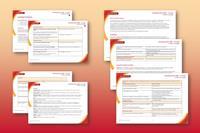Encourage scientific thinking and working, to improve evaluation skills
This resource accompanies the article Evaluate as you experiment, part of Teaching science skills from Education in Chemistry.
Learning objectives
- Understand what is required when evaluating an experiment or investigation.
- Identify the aspects of a named investigation that are relevant to its evaluation.
- Evaluate the aspects identified and use them to write an overall evaluation, if required.
The points on the student sheets list the different aspects of evaluation that your learners need to be aware of. Not all of these points will apply to every investigation so learners need to be able to identify what is relevant to them. Completing the table at suitable intervals during an investigation will help your learners evaluate their work.
Introduction
Being able to evaluate a practical procedure, the data collected and the conclusion is an important part of most 14–16 and 16–18 chemistry courses. This resource includes a student sheet, with a scaffolded version available, to take learners step-by-step through the evaluation process. The Education in Chemistry article outlines the rationale for evaluating an investigation at suitable intervals as it is carried out, rather than tagging it on as an afterthought at the end.
The questions in the table aim to focus learners’ attention on the points they need to consider when evaluating. The list of questions is not exhaustive and can be adapted to suit different investigations. You can find an experiment specific example for a rates of reaction investigation in the teacher notes.
How to use the resource
Use the resource with a few selected investigations during a course to guide your learners through the evaluation process.
Ask your learners to complete the ‘Evaluating the planning’ and ‘Evaluating the apparatus’ sections before they carry out the experiment. The ‘Evaluating the method’ section can either be done while the experiment is carried out or directly after. If learners complete this section during the experiment, make sure they are observing safety precautions and are not introducing additional errors. Learners should answer the ‘Evaluating the conclusion’ and ‘Improvements’ sections while processing their results. Alternatively, practical groups can be organised with one learner responsible for evaluating the investigation. They can share their evaluation with the rest of the group when appropriate.
The lists of points on the sheets are not exhaustive and can be adapted as required.

This article is part of our Teaching science skills series, bringing together strategies and classroom activities to help your learners develop essential scientific skills, from understanding ethics to modelling and more.
Scaffolding
Evaluation is a higher order thinking skill that many learners find difficult. The terminology required will be new to many of your learners. The scaffolded version of the worksheet (indicated with an ‘S’ icon in the header) includes prompts in simple, everyday language as far as possible and sentence starters to provide additional support for your learners.
The ideal outcome is that learners will develop the skills to evaluate their practical work without prompts from these worksheets.
More resources
- Help students evaluate experiments with a worksheet comparing different methods and a card sort on improving accuracy and reliability.
- Link to other skills, such as developing a hypothesis and planning, with the candle burning investigation for learners aged 11–16.
- Find ideas and activities to help your students understand accuracy and error.
- Highlight chemistry careers that use evaluation skills, for example this video job profile of Saba, principal air quality consultant.
Downloads
Evaluating experiments teacher notes
Editable handout | Word, Size 0.46 mbEvaluating experiments teacher notes
Handout | PDF, Size 0.15 mbEvaluating experiments student worksheet
Editable handout | Word, Size 0.46 mbEvaluating experiments student worksheet
Handout | PDF, Size 0.13 mbEvaluating experiments scaffolded student worksheet
Editable handout | Word, Size 0.46 mbEvaluating experiments scaffolded student worksheet
Handout | PDF, Size 0.14 mb



















No comments yet